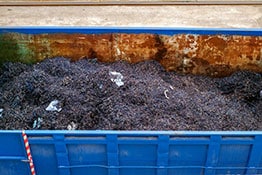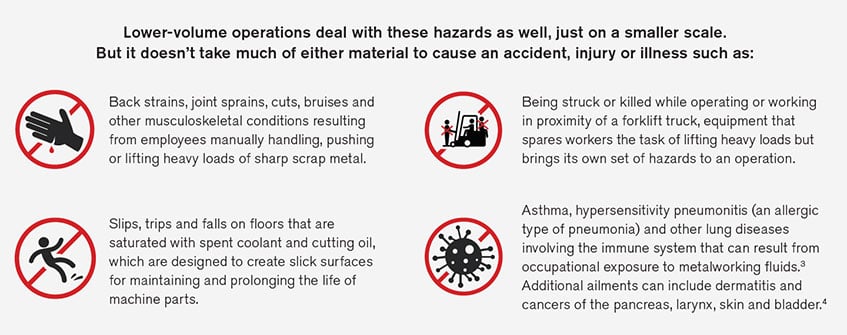
Accidents and injuries in the workplace are going down in the US, but the costs associated with them continue to go up. There is a long way to go in reducing these costs, especially in certain areas of the metalworking industry. Fortunately, there are solutions available to decision-makers when they choose to seriously consider the application and benefits provided by core automated processes used in the handling of metal scrap and spent fluids.

Metalworking operations typically generate pounds of metal chips and turnings for every metal part they machine. In the process, they also use large amounts cutting fluid to facilitate faster cutting and send the scrap material away from the tool. Factor in the number of parts a high-volume operation machines per day, with scrap and coolant ending up on the shop floor, and it becomes clear how cluttered, wet walking surfaces can create several potentially dangerous scenarios. A few of these include:

To reduce hazards in the metalworking operation it is imperative to automate the chip and fluid management process. Some of the systems used include:
By reducing metalworking scrap to flowable chips and separating chips from spent fluid for recycle or reuse, an operation can use less floor space and create a cleaner working environment using briquetters, crushers and shredders, wringers and centrifuges, and horizontal screw presses.
Coolant is essential to the metalworking process, but it presents some challenges for employees who must work within close proximity to it. Used coolant produces a rancid odor as the bacteria within the contaminated fluid propagates and requires treatment with expensive biocides to control the foul odor. Employees can also be vulnerable to skin irritations resulting from rancid coolant contacting exposed skin. PRAB Guardian™ Coolant Recycling Systems and tramp oil separators can help prevent these consequences.
Automated conveyor systems reduce or eliminate the need to handle sharp metal scrap manually or with forklift trucks. Some of the types of conveyors for moving metal scrap include steel belt conveyors, drag conveyors and in-floor trough conveyors.
Read our white paper to learn more about how PRAB automated scrap processing, fluid recycling and conveying systems help prevent accidents, injuries and illnesses in metalworking operations. PRAB’s experienced system specialists will help you select the best solution for your specific needs, achieve the greatest return on your investment and maintain the safest possible workplace.